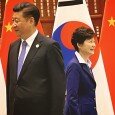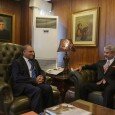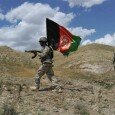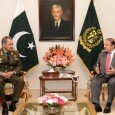By Shaiq Hussain –
For the common goal of eliminating militancy from the region, both Pakistan and Afghanistan will have to start a new journey of mutual cooperation, respect and trust while the world has pinned high hopes on the unity government
After months-long standoff between the leading Afghan presidential candidates, the grave political crisis in the war-ridden country was resolved amicably paving the way for the formation of a “unity government” that shared power between the two rivals, Dr. Ashraf Ghani, who became the President and Dr. Abdullah Abdullah, who was chosen as the first ever chief executive of the neighboring state.
This unique blend has the potential to bring the Afghan nation out of years-long war and strife and it has also brought an equally good opportunity for Islamabad and Kabul to reach out afresh to each other with an olive branch sitting together with an aim at settlement of their disputes and chalking out a roadmap for good friendly relations.
Dr. Ashraf Ghani has always been rated well and high across the globe for his strife for economically strong, peaceful and stable Afghanistan whereas Dr. Abdullah once considered to be a hard and tough guy when it comes to ties with Islamabad is also said to have learnt from the past and means business as for bringing back peace and normalcy to this ill-fated nation.
On the other side of Afghan border, we have Prime Minister Nawaz Sharif, who from the very initial days in office tried to embark on the road to peace and tranquility with the neighboring states, India and Afghanistan. Nonetheless, Pakistani policy makers say his strong desire and yearning for regional harmony and peace was not reciprocated with equal zeal by the former Afghan President Hamid Karzai.
Mr. Karzai, who spent years of his life in exile in Pakistan during the Soviet and Taliban eras, to the utter amazement of his Pakistani hosts, took little time to move away from Islamabad and get closer to its nuclear rival India. And his was long time in presidential office that the Pakistani foreign policy managers and military establishment blame for much of the bad blood that we see between the neighboring states.
Mr. Karzai had his own complaints about the alleged Pakistani support to Afghan Taliban and the Haqqani network, the most powerful militant group in Afghanistan. However, gone are the days of President Karzai and now it is an opportune time for the two sides to start afresh their peace efforts.
Pakistani authorities complain that the Afghan security forces are doing nothing to dismantle the ‘hideouts’ of anti-Pakistan militants on their side of the border, mainly in Kunar and Nuristan provinces. They also want Kabul to arrest and hand over top militant leaders like Maulvi Fazlullah, the chief of Tehrik-e-Taliban Pakistan (TTP) to Islamabad.
Moreover, Pakistani officials want a check on the part of Afghan authorities on India’s ‘anti-Pakistan activities’ on the soil of Afghanistan. Major General Asim Bajwa, Director General ISPR, told the newsmen in Peshawar recently that Afghan security forces were not doing what they were supposed to do when it came to action against TTP militants who had taken refuge in Afghan border provinces.
What Kabul wants from Islamabad is to do away with alleged support to the Afghan Taliban led by Mullah Omar. It also asks repeatedly for the eliminating of ‘terrorists hideouts’ in Pakistani tribal regions.
All these issues could be discussed upon though they seem difficult to be resolved soon. However, a step in that direction could serve the purpose well and both the nations that need peace and stability more than anything else in these testing times could start their journey towards that goal.
Prime Minister Nawaz’s advisor on National Security and Foreign Affairs, Sartaj Aziz told a parliamentary panel recently that President Ashraf Ghani was expected to visit Islamabad soon and he would bring along a package that aims at better and improved ties between Pakistan and Afghanistan. Ghani’s trip to Islamabad would be a great opening for the two nations and they should seize this moment.
British Prime Minister David Cameron has also invited Prime Minister Nawaz to attend ‘Afghanistan Conference’, which is going to be held in London in the last week of November. Cameron phoned Pakistani Prime Minister to invite him to the Conference and the latter accepted the invitation, according to diplomatic circles.
The objective of this conference is to develop a roadmap for the implementation of promises international community made regarding rebuilding of Afghanistan. This conference would extend another chance to the leaders of Pakistan and Afghanistan to talk peace and friendship.
With U.S.-led NATO forces’ withdrawal from Afghanistan not too far now both the states need to move away quickly from their conflicts and disagreements and start inching towards the settlement of contentious issues.
Once the United States and its western allies are out of this region, it would be a daunting task for both Islamabad and Kabul to tackle the menace of terrorism. Pakistan’s military offensive in North Waziristan, which has always been considered as ‘hub’ of militancy in the country, is a right step in right direction but in order to do away with this grave problem in totality, Islamabad and Kabul need to work and move together. They shared a long porous border with different dangerous militant groups making their presence very much felt on both sides of this frontier.
Hence, in order to curb militancy and terrorism, a complete coordination is required between the border forces of Pakistan and Afghanistan. They can begin with this act and build upon further on the border cooperation as for the settlement of other conflicting matters.































































































